 Petzlover
Petzlover Both Exotic Shorthair and Snowshoe are originated from United States. Both Exotic Shorthair and Snowshoe are having almost same weight. Both Exotic Shorthair and Snowshoe has almost same life span. Both Exotic Shorthair and Snowshoe has same litter size. Both Exotic Shorthair and Snowshoe requires Low Maintenance.
Both Exotic Shorthair and Snowshoe are originated from United States. Both Exotic Shorthair and Snowshoe are having almost same weight. Both Exotic Shorthair and Snowshoe has almost same life span. Both Exotic Shorthair and Snowshoe has same litter size. Both Exotic Shorthair and Snowshoe requires Low Maintenance.
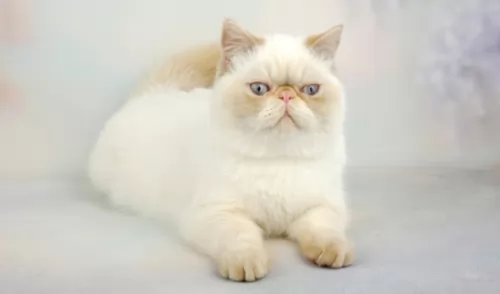 The Exotic Shorthair cat is such a sweet-faced cat that it is often referred to as the ‘lazy man’s Persian. This is because the face is also flat and pushed in like the Persian cat.
The Exotic Shorthair cat is such a sweet-faced cat that it is often referred to as the ‘lazy man’s Persian. This is because the face is also flat and pushed in like the Persian cat.
The Exotic Shorthair was in fact developed as a short-haired version of the Persian. It was in the 1950s that the Persian was used to mate with other breeds such as the Burmese.
The crossbreed gained recognition but some American Shorthair breeders produced a new breed standard that would disqualify American Shorthairs that showed any signs of crossbreeding.
It was in 1966 that the Cat Fanciers Association recognized the cat as a new breed and under the name Exotic Shorthair.
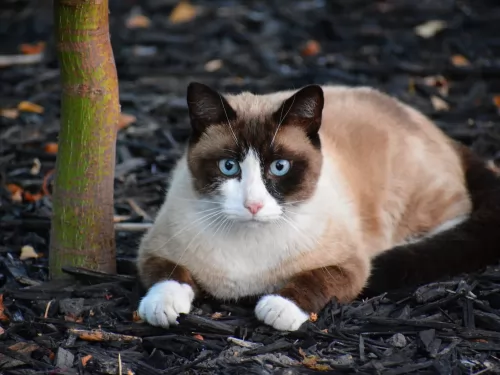 The Snowshoe is a short-haired, natural breed of cat. It is a bit similar in looks to the Siamese cat.
The Snowshoe is a short-haired, natural breed of cat. It is a bit similar in looks to the Siamese cat.
It was in the late 1960's that Dorothy Hinds-Daugherty from the USA devoted her time to developing a breed which was a mix of Siamese cat and American Shorthair. There was much enthusiasm for the new breed – the mesmerizing blue eyes and the lean, lithe, athletic body, .
This rare cat has been approved for championship status. In 1982 the Snowshoe was approved for championship status by the CFF and later by the American Cat Fanciers Association in 1990.
This beautiful cat has strict standards laid down for breeding.
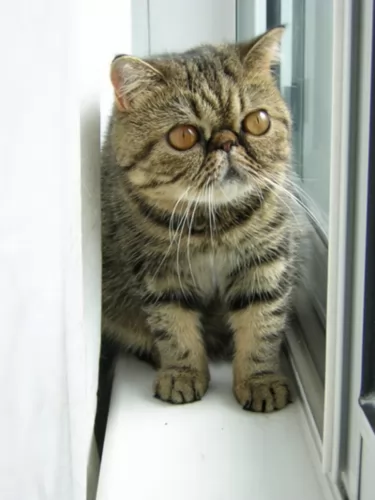 Developed through crosses between Persians and American Shorthairs as well as other cat breeds, the Exotic Shorthair looks like the Persian but he has a short coat.
Developed through crosses between Persians and American Shorthairs as well as other cat breeds, the Exotic Shorthair looks like the Persian but he has a short coat.
The coat is found in the same colors as the Persian cat – patterns and solid colors, ranging from chinchilla silver to tabby, tortoiseshell, black and white and bicolor. The eyes are large and round, the ears small and round and the tail fairly short and thick.
The Exotic Shorthair is a sweet, gentle, calm cat but a bit livelier than the Persian. They’re lively, friendly, and playful, but are also cats that like to sit in your lap and be stroked.
They get on well with children and other pets, being a loyal friend to the entire family. He quietly communicates with his human family with a soft voice. He is also quite adaptable to living conditions so long as his human family provides him with lots of attention.
He won’t want to be left for long periods of time on his own so he won’t suit living in a home where he is left alone all day.
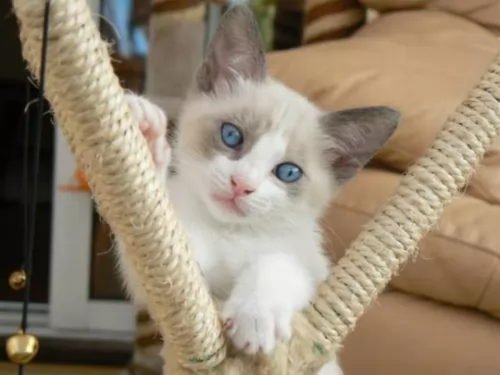 The Snowshoe is a medium-sized cat, with the body being longer than many other cat breeds.
The Snowshoe is a medium-sized cat, with the body being longer than many other cat breeds.
A distinctive feature with him is the white paws.
The cat can weigh between 5 to 7 kg. The legs of the cat are long and strong and the medium-length tail gradually tapers to a tip. The ears are fairly large with rounded tips. The smooth, short coat is white, brown, tan, and black and without an undercoat. He reminds you of a sweet treat - hints of chocolate and coffee shades with vanilla or light cream. He is pure white at birth, but after a few weeks, the coat undergoes a significant color change.
The face, ears, tail, and legs are darker in color than the rest of the body. The eyes of all Snowshoe cats are a sky blue.
Snowshoes are friendly, docile, and affectionate. They lap up the company of their human family, getting on well with children and other pets. They tend to be shy of strangers.
The Snowshoe is a fairly vocal cat and will let you know when he is hungry or he just wants to talk to you.
These cats are intelligent too and he can be taught a few tricks. He is very sociable and doesn’t like to be left on his own for long periods of time. Ideally, these cats should have a constant companion. They are active cats and like to be busy. You’ll need to spend some time with your Snowshoe as these cats love fun and games.
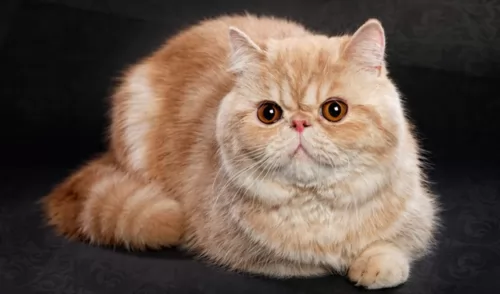 Your Exotic Shorthair is a loving cat and for those who prefer, it is a cat that is livelier than the Persian. While the Exotic Shorthair also has a mellow personality, because of its shorthair ancestors, it's more active.
Your Exotic Shorthair is a loving cat and for those who prefer, it is a cat that is livelier than the Persian. While the Exotic Shorthair also has a mellow personality, because of its shorthair ancestors, it's more active.
This Exotic cat can live to be 15, 16, or 17 if you care for him well and that means you have 15 years to share with a most wonderful feline companion.
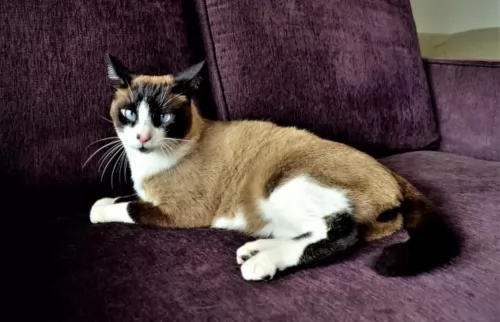 People who have already owned Snowshoes will tell you that they make splendid pets. They’re loyal and devoted to their human family, usually choosing a favorite person.
People who have already owned Snowshoes will tell you that they make splendid pets. They’re loyal and devoted to their human family, usually choosing a favorite person.
The fact that the Snowshoe is social and becomes so attached to people, makes him an awesome pet but just because he is fairly docile and amicable doesn’t mean he should be left alone for hours at a time. You’ll hear him voicing his displeasure at this.
He is certainly not a solitary cat, but an affectionate and most extraordinary cat.
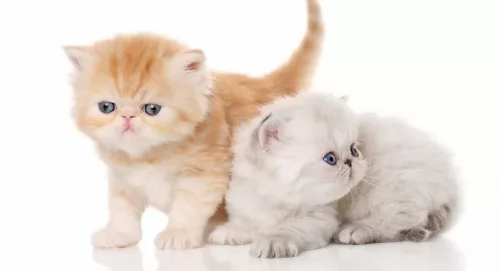 With the Exotic Shorthair, some of the diseases are genetic while others can be encouraged by poor diet and lifestyle.
With the Exotic Shorthair, some of the diseases are genetic while others can be encouraged by poor diet and lifestyle.
Obesity for instance is a major disease of cats and it contributes to many serious illnesses in cats. Excess weight shortens your cat’s life and contributes to arthritis and diabetes. The extra weight puts a strain on the cat's joints. Shedding just a little bit of weight can result in improved mobility.
Dental disease is a common chronic problem in pets. Make sure to check inside your cat’s mouth from time to time as serious dental problems can cause pain and interfere with the health of your cat’s important organs such as heart and kidneys.
All kinds of parasites can invade your Exotic Shorthair's body, internally and externally – worms, fleas, and ticks - and cause your pet a tremendous amount of pain and discomfort.
Brachycephalic Syndrome is a respiratory distress syndrome and it mostly affects what is known as brachycephalic cats – those cat with snub faces like the Exotic Shorthair.
The flattened features of the face make it that there is less space for the tissue to grow. The soft area at the back of the roof of the mouth hangs into the airway, obstructing it, and they can’t breathe normally. Sometimes the cats will require surgery to allow for more regular breathing.
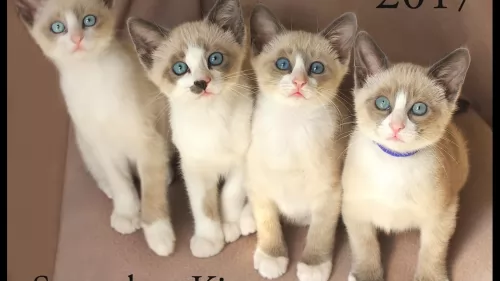 Your Snowshoe may well be a healthy breed, but every cat is prone to some illnesses. We look at some cat diseases you need to be aware of -
Your Snowshoe may well be a healthy breed, but every cat is prone to some illnesses. We look at some cat diseases you need to be aware of -
This is a feline disease found more often in Siamese cat breeds. The cat develops this protein disease between 1 TO 5 years of age. Amyloidosis is when there is an abnormal deposit of the protein complex amyloid into the liver, spleen and kidneys, resulting in bacterial infections, inflammation, and cancer.
Your Snowshoe’s teeth are particularly prone to gingivitis which is inflammation of the gums. It can lead to more serious conditions if left unattended. Other dental problems to watch for are bleeding gums, broken teeth, and swelling of the gums.
Have your Snowshoe spayed or neutered. Spaying or neutering decreases the likelihood of some cancers. Both males and females are less likely to roam too, making them more domesticated. The cat is less likely to spray urine as a territorial gesture too. Spaying or neutering is imperative if you want to avoid your cats being parents.
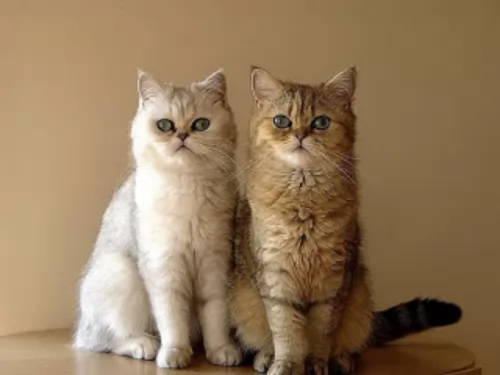 It is important to understand the type of foods available to your pet and how often and how much to feed him.
It is important to understand the type of foods available to your pet and how often and how much to feed him.
Most cats prefer to eat several small meals a day as opposed to a couple of large ones. Make feed times interesting and provide food puzzles to have your cat ‘prey’ for food.
Always read and understand the labels on the cat food packaging and be sure to always feed your Exotic Shorthair with the very best food there is and to follow the portion guides.
If you’re in any doubt or your cat doesn’t want to eat his food, try something else or speak to your vet about how to be sure your cat is getting fed the best food there is.
Make sure to have your kitten vaccinated as required. Also, when you take your kitten in to be vaccinated, the vet will also perform a check-up to make sure your kitten is healthy as these cats are susceptible to bacterial and viral infections.
Your cat has a short, low maintenance coat. A brush once a week can get rid of loose hairs and you and your cat will both enjoy the therapeutic bonding between the two of you.
Check your cat’s inner ears for wax and debris as well as for signs of any infection, and if you don’t want to do that, professional cat groomers can do it for you.
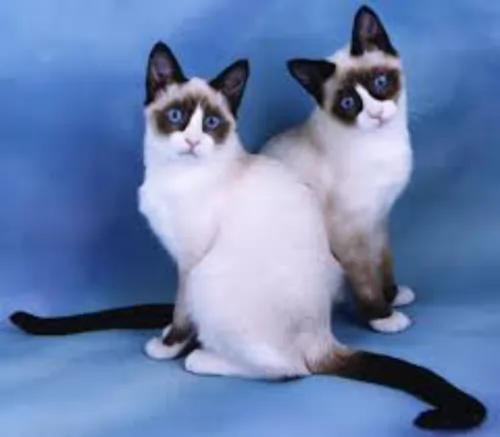 Provide your Snowshoe with the best cat food that there is. Always be aware of excess weight with your cat and avoid it at all costs. Extra weight is an influential factor in the development of diseases such as diabetes and arthritis.
Provide your Snowshoe with the best cat food that there is. Always be aware of excess weight with your cat and avoid it at all costs. Extra weight is an influential factor in the development of diseases such as diabetes and arthritis.
A proper diet for your Snowshoe will ensure that your vet expenses are less. The nutritional needs of your Snowshoe will be protein, minerals, vitamins, fatty acids, and enzymes. Your cat is a carnivore and his food needs to be high in meat and protein. He isn't going to require any carbohydrates. Speak to your vet about the best food for your feline friend.
Provide your Snowshoe with a constant supply of fresh, cool water.
Your Snowshoe will appreciate some cooked meat once in a while. Some tasty tuna now and then which is rich in omega-3s will also go down well.
Cats are fastidious about cleanliness so ensure his litter box is always clean. Scoop out the feces every day.
The Snowshoe has a low maintenance short coat, and a weekly brush will keep his coat shiny and glossy and he’ll love the attention this brushing session provides.
Cats like to scratch, so provide your Snowshoe with a scratching post as this will save your furniture from being used as a scratching post.
The Snowshoe cat is regarded as a low maintenance cat in terms of his short coat which needs to be brushed once a week. Brushing the hair will remove dead, loose hair and distribute skin oils to keep the coat in tip-top condition.